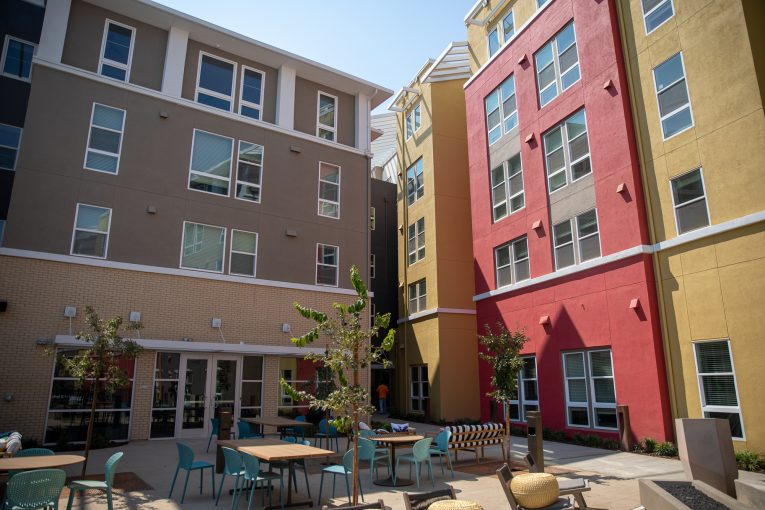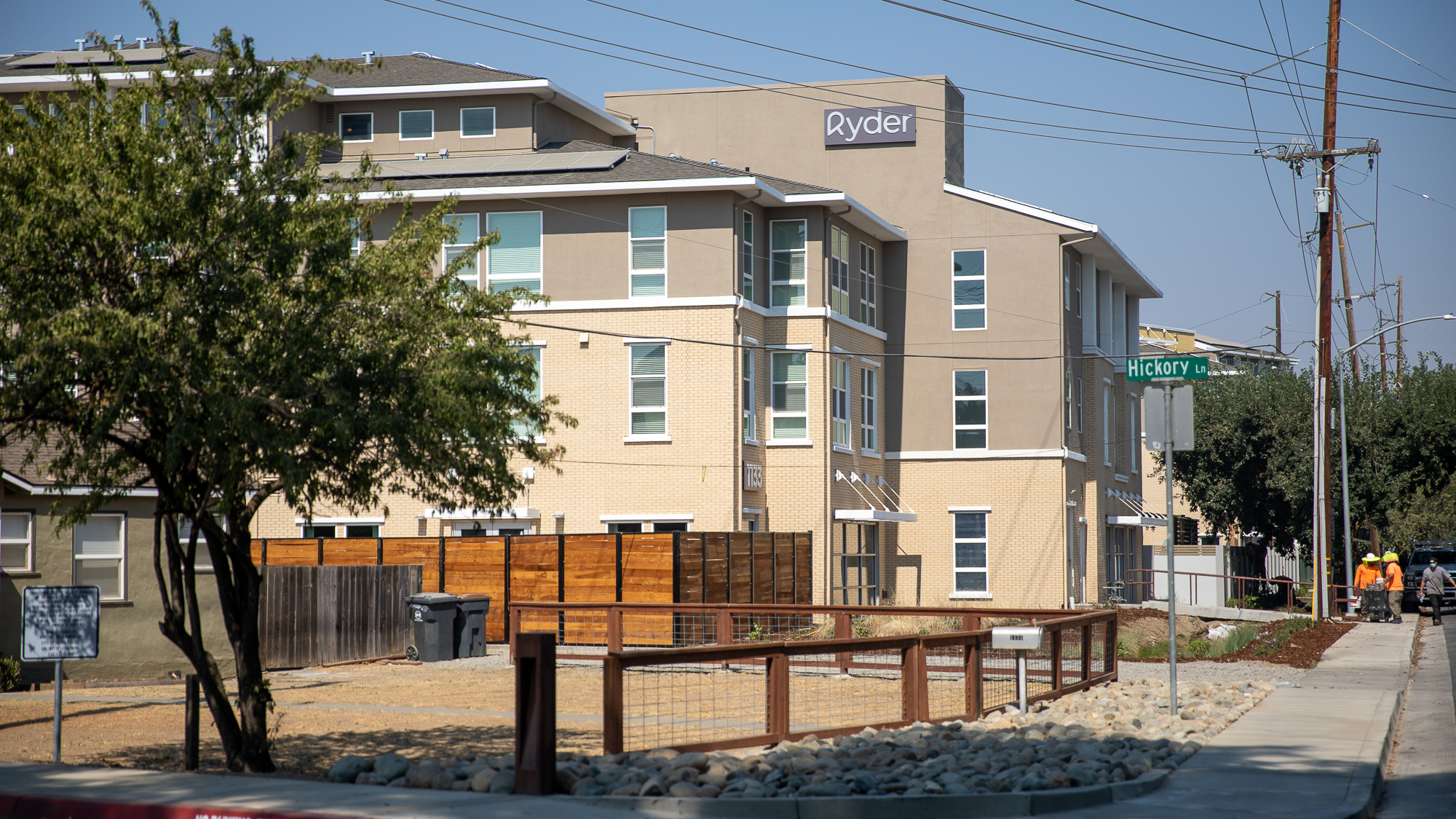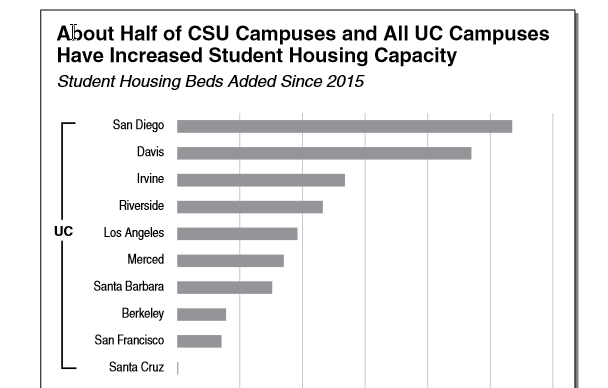

By David M. Greenwald
Executive Editor
The LA Times this weekend chronicled a reemerging crisis—unhoused college students.
The Times feature UC Santa Barbara student Kris Hotchkiss, who they report has “to endure a leaking roof, soggy bedding and power failure that shut down the ceiling fan, refrigerator and lights for six weeks. He has no shower or toilet.”
Why” “That’s because he lives in a van — the only affordable shelter he could find.”
Recently, UC Santa Barbara’s plan to build a 4500-bed mega dorm, with tiny rooms and few windows—some dubbed it Dormzilla—sparked outrage and national headlines.
(My reaction was: now that’s a megadorm. Lincoln40 looks like a luxury hotel compared to that. Actually at times it just looks  like a luxury hotel).
like a luxury hotel).
The Times writes that “the more urgent problem is a campus affordable housing crisis hitting thousands of students across California’s three public university systems — leaving some unsheltered, others with mounting debt burdens and many filled with anxiety and stress.”
We got a respite for a year from the student housing crisis across the state, but now it’s back and apparently worse than ever.
The Legislative Analysts Office issued a report on November 8 to Assemblymember Kevin McCarty, who Chairs the Subcommittee on Education Finance.
Since 2015, CSU has added 14,300 beds while UC has added 21,700 beds, that is 36,000 new beds. Despite that, more than 16,000 students at the University of California and California State University were on waitlists for housing this fall.
“For fall 2021, eight UC campuses report waitlists totaling more than 7,500 students. Some campuses report increases over pre-pandemic levels, whereas others report substantial reductions,” the LAO reported.
UC reports 11 housing projects under development at 6 campuses adding more than 16,000 beds—that includes ones at UC Davis.

UC Davis has added the second most housing capacity in the system behind only UC San Diego.
One problem—housing capacity has only slightly outpaced enrollment growth.

According to the LAO, “UC does not systematically collect data regarding on-campus housing charges. Campus officials emphasize, however, that their housing charges are intended to be below market.”
However, that has not been our experience—and indeed, the LAO recognizes that.
“Despite campuses aiming to have below-market housing charges, students living off-campus report paying less on average for their total living costs than students living on-campus,” the LAO finds. “Off-campus students have somewhat more control over their living costs in that they can choose to have more roommates or scale back on food expenses.”
In the meantime, an Assembly subcommittee memo reports that of the California Community colleges, only 12 of 116 campuses have housing programs, which shelter 2,400 students.
Traditionally community colleges have not offered on-campus housing, but “[m]any community colleges have begun housing planning processes due to student needs.”
A memo from the same Assembly committee notes: “Student housing has rarely been a discussion point for this subcommittee, as the state does not traditionally support housing costs and has left campuses and the systems to develop and support their own housing programs, supported by student rent. Given the state’s housing crisis, however, that is changing.”
They continue: “In urban areas, local market rental rates – among the highest in the country – are forcing students to pack into apartments or homes, and in rural areas, many campuses do not have enough local housing to accommodate current or future enrollment levels.”
The result is catastrophic: “Homelessness is prevalent across California’s three higher education segments, with 1 in 20 students at UC, 1 in 10 students at CSU, and 1 in 5 students at California Community Colleges (CCC) reporting experiencing homelessness at some point during the academic year.
“Even more students experience some form of housing insecurity.”
The LA Times notes: “The campuses traditionally weren’t meant to offer residential life for commuter students. But the need is so high, with 20% of community college students reporting homelessness, that 81 colleges have submitted applications for new state housing grants to plan or construct dorm projects.”
Kevin McCarty told the Times that increasing student housing was now a key legislative goal as they continue to seek ways to boost UC enrollment to qualified California students—“tens of thousands of whom were rejected by their campuses of choice this year.”
The Times reports, “That concern prompted him to help secure the state’s first substantial contribution to student-housing projects this year, amounting to $2 billion through 2023-24, for the UC, Cal State and community college systems.”
“We have a housing crisis in California. We have a student affordability issue. And there’s a legislative push to dramatically expand enrollment for California students,” McCarty told the Times. “So we think it’s smart for us to get in the business of helping build more student housing.”
But barriers remain to student housing.
The Times cites a Santa Cruz family complex which was set to open but due to litigation, “we have yet to put a shovel in the ground,” Chancellor Cynthia Larive told Assembly members.
As usual, “opponents argue that UC has not adequately examined the impact on traffic, for instance, or the natural environment, such as an iconic meadow at Santa Cruz.”
In Santa Barbara of course, UC Santa Barbara believes that the mega-dorm project is crucial to addressing housing needs and this would in fact add 4,800 beds by 2025.
The problem isn’t the project, but protesters hate the design by billionaire Charles Munger, who pledged $200 million for the project.
“The proposed 11-story structure would house some 4,500 students in a warehouse-size building where about 94% of the units do not have windows,” the Times writes.
While I am somewhat skeptical about complaints, this one seems legit.
All of this is to show that the problems in Davis are not exclusive to Davis. The state may kick in money for housing, but it is still going to be up to the local communities to address housing needs.







YES, this is why we need lots of housing within a ten-minute bicycle ride to Silo or MU… not in noisy and otherwise polluted locations right next to I-80, but on or on top of existing parking lots on and off campus and other infill areas. There are lots of these all the way up to and including West Covell and down into South Davis (consider the new Pole Line to Olive connection…)
It is very unfortunate that University Commons – directly across the street from campus will have space used for parking – that could instead be housing. Parking is nice but housing is nicer. If Trader Joe’s etc want parking so bad they can pay to have it underneath housing, sub-surface or otherwise.
If we want the world to take note of our creativity, we should also build on top of 113 in the large section where it is below grade! Bike routes here would lead directly to campus! Genius! People who live here could also have instant access to transit that uses 113, including a shuttle to Davis Depot! So very Davis!! Have we lost our way??
How are things at the Safeway parking lot not that students are back?
Which Safeway parking lot was that now?
South Davis. I haven’t seen as many people sleeping out there as pre-pandemic.
South Davis; I had guessed it was the Covell location . . .
There is a lot more student housing in town than before the pandemic. “Affordable” ? Not so much, depending on how you define ‘affordable’.
Lincoln40 is a luxury hotel. As you well know, having toured it. Pet washing facilities, in room laundry, pool, spa, yoga . . . it ain’t no Motel 6.
WTF? Sounds like a Beacons warehouse. But hey, better than living in a van down by the river.
https://www.youtube.com/watch?v=bXk3teJpzGU
.
The Times has hit the nail on the head … actually it has hit two nails on the head with the one comment … the cause of the crisis and who should be providing the solution.
The key word the Times included in its comment is “campus” (or if you prefer, “campus affordable”). The root cause reason that thousands of students are unsheltered and/or with mounting debts and/or filled with anxiety or stress is because th UC system has been ruthless in the pursuit of its business plan. Enrolling more students means more revenue for the system … and the enrolled students are left to bear the consequences both in the classroom (ever increasing numbers of students in classes and a shortage of academic support facilities, to name just two) and outside the classroom. This is a problem that has been 100% created on the campuses by the campuses.
During the campaigning in the 2019 Presidential Primaries, Bernie Sanders engaged the issue of higher education affordability head on. As a society we need to invest in our future, and the college/university enrollment increases are one of those investment steps, but we, as a society, need to stop placing the affordability burden on the shoulders of the students. That burden needs to fall squarely on the college/university administrations … and in the case of the UC system, their major source of funding, the government of the State of California and to a lesser extent the Federal Government.
The UC campuses have created this crisis and the UC campuses and the California state government need to shoulder the burden of solving it.
JMO
A decade ago state funding of UC amounted to about 11% of the UC budget. I believe it’s an even lower percentage now.
That is very helpful to know Don. Thank you for sharing. It is interesting to think that state funding has declined at the same time that enrollment has increased substantially.
We as a community have a responsibility to help guide college students towards adulthood and productive members of society. That means incorporating them into our community through housing. As I’ve pointed out, Davis is what it is entirely because of UCD–the clear alternative is Dixon as I wrote in 2016: https://mcubedecon.com/2016/05/16/nishi-and-our-obligations-to-other-californians/ Get similar clear conclusions from the “controlled experiment of splitting Germany in 1945: https://mcubedecon.com/2014/07/06/how-do-we-best-induce-technological-innovation-weve-already-run-that-experiment/
That means that we need to provide in large part the solution to this problem. As a city full of professionals and small business owners, many of us have built up our wealth with the help of Californian’s giving a subsidized college education. We can’t tell younger generations that we’re going to withhold what we enjoyed.
HORSE MANURE! Davis does not have some mystical magical spiritual obligation to a billion dollar entity that sits right outside of it’s city limits.
I wish this irrational sentiment along with the idea of the flat earth would disappear.
Comparing community responsibility to flat earthism isn’t a rational argument. One is obviously false the other is a value judgement. Davis doesn’t have a legal responsibility to UC but many in this community, myself included, feel the the two jurisdictions are better off when they work together for the betterment of all.
By the way, I don’t hold your short tenure in Davis against you. You are certainly welcome here despite the fact that you hold some opinions that differ from my own. Still, as I have pointed out before, Davis and UCD have a long history of the kind of mutualistic relationship I favor, whereby the University built the campus and the city built the housing. Everyone prospered under this model for a long time.
I’m all for working together for a mutually beneficial solution. I’m against the idea that city has an obligation to UCD students. I’ve even proposed a few student oriented housing solutions that I believe would have mitigated impact on the city’s resources as well as provide sales tax revenue due to a mixed use design and entertainment based focus.
I’ve been here more or less for 15 years. My wife was born and raised here. I own property here. My kids go to school here. I know more about land use than most people.
UC campuses are partially to blame, but the local communities are also to blame almost across the board. Letting communities like Davis off the hook when they failed to produce student housing for two decades is silliness.
That post is “silliness”… no proportionality as “blame”… yes, “local communities are also to blame” has a kernel of truth… not “factually innocent”…
So honest question, Craig, what is the ‘proportionality’ in your view? If we are to play the “blame game” , who do you look to for remedies? It is what it is… how do we move forward? Meant as honest questions…
BTW, Craig, if you share your “proportionality” views, I will share mine. And is NOT 100/0 view, in my mind…
It is also tempered UC Davis buying City properties, taking them off the tax rolls, to house students… same impacts to the City, lesser revenues…
Honest question? Right. If you don’t build housing to accommodate the people living in your community, you are part of the problem. I’ll leave to others to decide how much blame to assign, there is plenty to go around.
Who’s problem? Your making your problem my problem because you feel entitled to housing? Go to schools somewhere else if you can’t afford it here. Go complain to UCD if you find housing solutions inadequate for students.
Craig… will try this again, as it appears my previous post got “nixed”…
[edited]
Fish or cut bait.
Here is my opinion… UCD should house 25-30%… 60% City (available units, no guarantee on affordability [a sub-topic you cleverly avoided discussing])…
To achieve additional student housing in Davis (including affordability) are you prepared to put your money where your philosophies are?
I am… and will directly or indirectly pay to follow thru with my opinion… are you? (for whatever unstated philosophies you have)… or are you advocating that OTHERS should pay the direct and indirect costs to City folk to accommodate your philosophies for the student population?
I’m “in”… are you?
Fish, or cut bait.
Why should the city of Davis have any obligation to UCD? UCD is not under the city’s jurisdiction.
If students want to go to UCD…fine…great. But why there’s some sense of entitlement by students that the city should plan housing for their life choices is absolutely ridiculous.
Doesn’t the city has a responsibility to provide decent housing to the 27,000 students living in town?
Why does Davis have the responsibility to house anyone? If you can afford live here. Fine. Students are like everyone else.
But now it will?
Pray tell housing being supported by rent
And now it will . . .
Seems, slowly, housing for the masses will be paid for by the government. What could possibly go wrong?
As opposed to any other year? And what does that have to do with housing?
I don’t think it was year specific. What does this have to do with housing? They are going to increase enrollment, thus it will impact housing.
The UC rejection rate has been rising for at least the last decade as it becomes a more attractive choice. That means that demand for an education is rising but supply isn’t keeping up.
I agree with your earlier point that direct government provision of housing is generally a bad idea. The better solution is to have the private sector supply it–now we need to get going in our locality.
Does that mean full high-speed, top of the line wi-fi/web access; spaciousness; good location; amenities; AND being VERY AFFORDABLE to boot? It appears some do… it ain’t going to happen.
Shot clock again…
IMO, it is neither the legal nor moral RESPONSIBILITY of the City… more an altruistic, charitable OPTION…
Please don’t tell me what I HAVE to do… them’s fighting words… asking me is a different thing…
Don’t go there… I’m a ‘newbie’… only been in Davis for 49 years (not counting a 2.5 year hiatus). We own property here. My kids went to school here. I know more about land use, property law, codes, etc. than most people…
Don’t go there… 95% of the folk “don’t care”… save your breath… mine has oft been wasted. Been there, done that.
I’m not going to give my stats. I’m sure some doxxer-spy-commenter already knows more about me than I do. While 15 or 49 years may seem like it should be impressive and give standing, to those who are looking for subsidized housing*, we are just old and privileged and in the way. Nothing else matters.
*”the state does not traditionally support housing costs . . . given the state’s housing crisis . . . that is changing.“
Wish I had a dime for every time I’ve heard this.
Alan M and Keith O proved my point.
?
Double ??